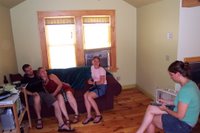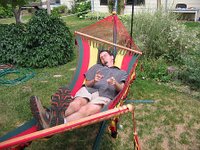Well, the terminte inspection happened today at our Tulsa home; we came through that with flying colors and it looks like we'll close on July 21st. It's been an interesting process doing this by ourselves (without a Realtor), and has had a bit of a learning curve, but it's all come together. Given that we're also buying a house in St. Paul, I now know more about Mortgages, Homeowners Insurance, Title Companies (closing companies), and Realtors than I ever knew before. The bottom line is that no one is really out for you - they all want a piece of you, but they aren't really looking out for you. We ended up going with Eloan, which offered us a good rate on a 5 year ARM, and Country Financial for homeowners insurance, which offered us a good rate if we bundled our car insurance with them. Eloan is also going to credit my account with some Frequent Flyer miles, too, per $10,000 of the loan. So it's all winding down; today, I canceled a bunch of utilities and our phone. We'll be hooking stuff up at St. Paul. We close in St. Paul on July 25th, which is darn close.
I finally mowed the lawn and I think I'm going to go home soon and clean out the gutters and pack a little bit more. A box here, a box there, it's slowly getting done. We're using movers, which is a new thing for me, but it sounds like it will be good; my back has been really sore, so it'll be nice for other folks to haul things around. On Aug 1st, my internship starts at Unity Church. I am excited about that, but it still feels really far away.
As some of you know, in early May, the 3 year old daughter of the Sr. Minister at All Souls, died unexpectedly. It was such a shock - so painful - so unimaginable, and it's still working it's way through me. I spoke at her eulogy which was the hardest thing I've ever had to do. Just yesterday, I heard that another church member's five year old son died in a car accident. It's just too much.
It makes me believe in hell, in a way I never have before. I believed in hell before, as a sort of abstract painful, violent, oppressive, dark place here on earth, but a part of me now really nows the reality of hell. Hell is a very real thing/place. It's not separate from "heaven" and god doesn't put you in hell. Love and god can both frequent hell and often do; it's what helps us emerge from those places. But hell is real. It's dark. It's deep. It touches so many people and in so many different ways. My role as a minister is to seek to lessen the very real hells that exist in this world, or at least to have the courage to journey into the hells that others are in, and bring my presence, my faith, and my love.
....
I'm going to post my final sermon or two from All Souls, since I don't think those have been shared yet.
love,
jms
May 21, 2006 Sermon, “Driving at Night” by Justin Schroeder
I’m going to testify today!
And you all can start witnessing, when you feel the spirit!
I’m going to testify to that “Holy Ghost Fire,” that the Jones Sisters sang about, that spirit of love and compassion, that moves in our lives even in the darkness, despair, and uncertainty.
I think of what author E.L. Doctorow, says about writing and life.
He says, “It's like driving a car at night. You never see further than your headlights, but you can make the whole trip that way.”
I’ll testify to that: many years ago, I was driving at night in the Rocky Mountains in Colorado. I was on my way to a cabin to stay with friends.
I left late in the afternoon, and darkness had fallen and I was still driving. I slowed down, because all I could see was the 30 feet in front of me that the headlights illuminated.
The road twisted and turned and twice I nearly hit deer, scared frozen in my headlights.
It was frightening, but I finally made it.
“Driving at night” is exactly what we’re going through now, as a congregation, with the unexpected death of Sienna Lavanhar, and all the accompanying grief that that has opened and reopened in our lives.
We can’t see past the headlights to what’s next…and there’s no road map for doing the hard work of driving at night.
It often feels easier and safer to stay in the light.
There’s a story from the Middle East called “The Lost Key:” “One night a neighbor strolling by Nasrudin’s house found him outside under the street lamp brushing through the dust.
‘Have you lost something, my friend?’
“I’ve lost my key. Can you help me find it?”
After some minutes of searching and turning up nothing, the neighbor asked him, ‘Are you sure you lost the key here?’
Nasrudin answered, ‘No, I didn’t lose it here. I lost it inside the house.’
‘If you lost the key in the house, Nasrudin, why are you looking for it out here?’
“Well, there’s more light out here, of course.”
As the Rev. Mary Samuels says, well-lit places are the safe places of life, the easy preoccupations that keep us from feeling the loss of someone, or the impact of a transition, or change.
We keep busy, we deny, so our minds won’t go to the emptiness or darkness.
It might be easier to search for the key in the light, but the real aliveness - that holy ghost fire – that aliveness we long for, and fear – comes only from driving at night.
And that’s where we are.
I think of Jacob from the Bible.
After leaving his uncle, Laban, Jacob goes to meet Esau to make amends after stealing his birth rite.
The night before he meets his brother, Jacob collapses into a deep sleep, alone in the wilderness on the bank of the Jabbok river.
During the middle of the night, a stranger, perhaps an angel, it’s not clear, comes and wrestles with Jacob.
All night they wrestle – intertwined.
When this stranger sees that Jacob can’t be overpowered, the stranger cripples him with a blow to the hip - which leaves Jacob with a limp.
But still in Jacob’s grasp, the stranger says, “Let me go, for it is daybreak.”
Jacob replies, “I will not let you go unless you bless me.”
The stranger asks, “What is your name?”
“Jacob,” he answers.
Then the stranger says, “Your name will no longer be Jacob, but Israel, because you have struggled with God and with men and have overcome.”
Then he blessed him there.
One could say that in the darkness Jacob wrestled with his doubts, fears, and weaknesses…and with the dawn’s light, was a different person.
This very human struggle, this wrestling, this “driving at night,” whether it’s the changes that come with graduation, leaving or grieving, is, as Benedictine nun and writer Joan Chittister says, about “vulnerability, darkness, exhaustion, and scarring.”
Yet, with the aid of the “holy ghost fire,” it is possible to emerge, as Joan Chittister says, out of the darkness and struggle with the deepest gifts of life – conversion, faith, courage, surrender, endurance, and transformation.
With a limp or a scar, yes, but also blessing…
"Jacob does what all of us must do," writes Chittister, "if, in the end, we too are to become ‘real.’ He confronts in himself the things that are wounding him, admits his limitations, accepts his situation and rejoins the world."
[1]It’s easy to celebrate power, confidence, victory, and abhor and fear weakness, struggle, and doubt…but it is precisely there that the “real aliveness” comes from.
[2]Right now, we (this congregation, our graduating seniors, me) are all driving at night – in that human struggle - all of us on the verge of something new and unknown.
We want answers and assurance about the future, what’s next on the road, but all we know for sure is that we have the gift of today, with the holy ghost fire flickering around us.
In the darkness, amidst the wounds and scars, we can learn how to become like that holy ghost fire.
As we “drive at night,” facing uncertainty and transition, we can become, as the proverb says, the candle of the lord!
The Rev. David Bumbaugh writes, “A candle is a careless thing…it is always stretching up and reaching out.”
[3]It gives its substance without murmur or complaint to the flame that is consuming it. It doesn't even seem to care into what corner the flame flings its light; whether the corner is clean or dirty, far or near, deserving or forgotten. It doesn't care to whom it sends its warmth; whether to the outer chill, a lonely heart, a child's delight, a bore or a lout.
A candle that tries to conserve its substance is poor company on a dark night. It was pleasant to look at in the day time – slender and smoothly appealing. But any candle that does not give itself away is a disappointment in the deepening shadows of a long evening.
A candle must give itself away.
In the giving, the spending, the spreading, the sending, it finds itself.”
As we drive at night, let us spend ourselves, careless with our love.
Let us become candles of the Lord – lighting the way for each other, giving our lives to the holy spirit of fire without murmur or complaint, like the sun shares its light with the earth, never saying, you owe me!
[4]Today is graduation Sunday – and although change is in the air for all of us, we have shared the road together as fellow travelers for many years.
These memories will remain…
We honor what we have shared together by making room for the new, by launching what needs to be launched, by saying goodbye, and by loving that which remains.
Ultimately, we have no choice, because life churns on, bursting, bubbling, ebbing, flowing – like the river, and sea, never staying the same.
And yet what remains, through all of this – my leaving, Sienna’s dying, any death, all change - is that holy spirit of fire that I’m testifying to – that calls us to burn, to catch fire, to spend, to send, to give, to “repair, renew, and recover”
[5]: and in doing so, in catching fire and giving ourselves away, we find our deepest selves…that core which remains.
I close with a poem from Rabbi Harold Schulweis:
We have seen Yitzhak PerlmanWho walks the stage with braces on both legs on two crutchesHe takes his seat, unhinges the clasps of his legs,Tucking one leg back, extending the other,Laying down his crutches, placing the violin under his chin.On one occasion one of his violin strings broke.The audience grew silent but the violinist didn’t leave the stage.He signaled the maestro, and the orchestra began its part.The violinist played with power and intensity on only three strings.With three strings, he modulated, changed, and Recomposed the piece in his head.He retuned the strings to get different sounds,Turned them upward and downward.The audience screamed delight, applauded their appreciation.
Asked later how he had accomplished this feat,The violinist answered:It is my task to make music with what remains.
As we ‘drive at night,’ and bravely face the world and all that it offers, may we too make music with what remains. May be it be so. Amen
[1] From
http://www.journeywithjesus.net/Essays/20050725JJ.shtml.
[2] Ibid.
[3] Bumbaugh wrote this based on John Wood’s poem, “A Candle is a Careless Thing.”
[4] This is a reference to a Hafiz poem.
[5] From a sermon by Rev. Mary Samuels.
“A Good Goodbye” by Justin Schroeder 6/4/2006
I haven’t always been good at goodbyes.
As I shared in my final Soulful Sundown service last month, I wasn’t really aware of this, until a good friend, back in Colorado, said to me, “Hey Schroeder, you never really say goodbye to anyone. You just kind of sneak out of the room.”
“What do you mean?” I said.
“Well, you say, ‘See you later, or take care, or after a while, crocodile,’ but you never say, ‘Goodbye.’”
“What?! Yes, I do!”
But the more I thought about it, I knew he was right.
It was easier to slip out, to sneak away, to say something other than goodbye, because goodbyes, even little goodbyes, were hard.
As the Rev. Elizabeth Lerner says, “Goodbyes acknowledge endings, and there is so much tied up in endings – attachment, loss, uncertainty, sorrow, loneliness, or even fear.”
It’s true.
It’s easier to pretend a goodbye isn’t happening, than to actually acknowledge something is ending.//
In some ways, it’s no wonder, because other than funerals and memorial services, which are extreme goodbyes, our society doesn’t give us many ritualized chances to say goodbye for the endings, even mundane endings, in our lives.
So this is our ritualized chance to say goodbye to each other.
And for a good goodbye, whether it’s for children leaving for college, a relationship that’s coming to an end, or a pet that’s gone, it is crucial, as Rev. Elizabeth Lerner says, “…to be willing to say goodbye without cutting out the caring which makes goodbyes poignant and emotional.”
Sometimes the emotions are almost too much, and we hardly know what to do with our caring.
I think of my grandfather, my mom’s father, who is not a particularly emotional man.
In fact, he didn’t really know how to do goodbye in words, but I do remember that his eyes would always moisten over – even if he was talking about something that had nothing to do with goodbye.
He may not have known what to do with the caring, but at least he didn’t cut it all out.
Because if something or someone deserves a goodbye, it should be real…and the emotion that’s there honors the relationship that’s ending.
Like I said at Soulful Sundown a month ago, I am determined to say a “good goodbye,” with lots of caring, because I owe it to all of you, and to myself.
We have been through so much together – especially this last month - and over the years, we have laughed, cried, worshipped, and worked together to nurture and change our little corner of the world.
By saying a good goodbye, we honor all that we have been through…
I also want to say a good goodbye, because when I left Fort Collins, Colorado, five years ago, I didn’t do a good job of saying goodbye, and it made leaving and then settling here very difficult.
It became clear to me that I had said to say “Goodbye” to the “Fort Collins” Justin.
I couldn’t just say, “Take care,” or “See you later.”
I had to say “Goodbye” to that part of who I was, so that the “Tulsa” Justin could be born.
It was not an easy process…but saying goodbye (to whatever it might be) is a way to formally acknowledge the changes taking places…it takes courage, honesty, vulnerability, and clarity to say goodbye well.
So I am determined to say a “good goodbye,” to honor what we’ve shared, what we’re feeling, and what it has meant…and to open space for the “St. Paul” Justin to be born as well as to open space for the many new “Hellos” that will surely come in our lives.
Done well, hellos and goodbyes can be part of a deep spiritual practice.
A good “hello,” really being present, paying attention to what you’ve just encountered, can reawaken us to the mystery and miracle all around us.
A good goodbye, although hard and perhaps akin to a miniature death of some sort, can help us stop and see the whole of what we’ve experienced, lifting to the surface what’s been important and meaningful, what has touched and changed us.
For me, despite the sadness of saying goodbye, gratitude has been lifted to the surface.
Gratitude for the humor, talent, and music of Rick Fortner and all of our choirs.
Gratitude for Kathy Keith for her strength and talents.
Gratitude for Marlin, for believing in me…
Gratitude for Panny McElroy, for believing in the vision of a Young Adult and Campus Ministry program.
Gratitude for Juliana, my partner, for her patience, wisdom, and love.
Gratitude for our entire staff.
Gratitude for life itself…
And gratitude, most of all, for you who are the church, and for all we’ve shared.
You have let me into your lives, and shared your dreams, sorrows, hopes.
You have let me be your minister.
One of the things I have most enjoyed is sitting on this chancel and seeing all of you gather in the pews, Sunday after Sunday – many of you sitting in your favorite seats, regular as clock work – almost defending your territory!
But it’s deeper than that.
When I sit and preach from this chancel and pulpit, looking out at you, I also imagine all the ministers that have sat on this chancel and preached from this pulpit.
All the people who have sat in these pews –
All the babies that have been dedicated on this chancel –
All the Coming of Age Credos shared,
The couples married,
The lives remembered,
The prayers, prayed – and I think of that mighty cloud of witnesses that are a part of our history and tradition.
It is in these memories, that I feel the very spirit of life, of the holy, of the divine.
We are not alone in this sanctuary!
We stand on the shoulders, and in the presence, of those who came before us –
great ancestors who fought for the freedom to believe as their conscience dictated,
who believed in humankind’s potential for great goodness,
who believed that reason could be a part of one’s faith,
who believed in creating heaven on earth,
and who believed in the unity of a loving God. //
There is something remarkable here at All Souls, a promise kept alive, a dream still being dreamt,
a vision beckoning.
That spirit was alive like never before at our 85th Anniversary Celebration at the Brady Theatre.
Two weeks later, that same spirit was present, as we gathered together to mourn the sudden loss of Sienna Lavanhar – and in the midst of that pain, we reaffirmed that love is indeed the spirit of this church and service is its law, and that our lives have a meaning and a purpose.
Through it all, and especially in this process of saying goodbye, I feel an undying gratitude to have been a part of this tradition and church. //
It makes me think we should practice saying goodbye
more often – monthly, weekly, daily - to the things and people we love.
Like in the story, “Goodnight, Moon,” when we go to bed, we should say goodnight and goodbye to everything in the room, everything we love, because there’s no rubber stamp guarantee of a new day, as we know all to well.
A heartfelt goodbye, for the day we’ve had, for the people we’ve known, for dear friends leaving, for whatever it might be, gives us room to feel, to let go, to find ourselves in a new kind of wholeness – and to greet the new day with a “Hello.”
And when that new day comes - when the sun rises, again, like a prayer answered, whether or not we prayed - and it is indeed a day that God has made, let us rejoice in it, and be glad.
Let us, as the poet, Philip Larkin, says, “Be kind, while there is still time.”
And let us remember that done well, hellos and goodbyes put us directly in touch with our own mortality and the truth that all life is change, holding on, letting go, holding on, letting go.
As the poet Mary Oliver says, “To live in this world you must be able to do three things: “To love what is mortal; to hold it against your bones knowing your own life depends on it; And, when the times comes to let it go, to let it go.” //
Now is the time for bravery and courage, for naming what is happening.
I am leaving. Our time together is ending and I will no longer be one of your ministers.
So today, amidst the tears and laughter, I am asking you to let me go.
Not to forget me or to cut off the caring, but to set me free, to launch me and Juliana.
As you set me free, know that what we have shared over the past 5 years, my early fumblings and fuddlings with Soulful Sundown,
the weddings and worship, memorials and meetings, prayers and pastoral visits, all of it –
burns brightly in my heart and will light up my future ministry in St. Paul. //
At the same time, I let you go.
I set you free, not forgetting or cutting off the caring, but setting you free, so that you can make room in your hearts for Debra Garfinkel and Tamara Lebak’s arrival and all the gifts that they bring.
It is time to say goodbye, to acknowledge what we have shared, and all we have done.
Remember that goodbye is a benediction of sorts, an act of blessing, which comes from the Latin and means, “saying a good thing.”
Goodbye means “God be with you…”
So this morning I say Hello, Goodbye, may God be with you – may that spirit of love, freedom, and healing, be with you today, and in the days to come!
With love and gratitude, Amen.
 icture of the garden area. The squared off area is ripe with lettuce, spinach, and other greens. And to the right of that is a horse radish plant and a fennel plant that might be dead. Just to the left of the brick pathway is a rhubarb plant (one that already here), plus two other ones that I brought with me from Tulsa.
icture of the garden area. The squared off area is ripe with lettuce, spinach, and other greens. And to the right of that is a horse radish plant and a fennel plant that might be dead. Just to the left of the brick pathway is a rhubarb plant (one that already here), plus two other ones that I brought with me from Tulsa. thing. I shimmied up the tree and looped it around. (But before that I stood on the ground and loop a rock, with the rope tied around it, up into the air, again and again. The shimmying method worked better.
thing. I shimmied up the tree and looped it around. (But before that I stood on the ground and loop a rock, with the rope tied around it, up into the air, again and again. The shimmying method worked better.



 a funny process. (A side note: now that I'm unpacking stuff here, I can't believe some of what I brought - we'll probably have another garage sale or something!) It was also sad to leave the T-Town pad, because although we didn't do much to the inside while we were there, we did all sorts of stuff outside, and it was hard to leave that. In fact, I didn't leave all of that - I took some rhubarb, some horseradish plants, some irises, and some seeds from plants I had put in this spring. So tonight put in green beans, cilantro, and dill. We'll see what happens. My guess is that it'll germinate and we might have some fresh cilantro. I'm also clearing out an area for some greens - lettuce and other stuff.
a funny process. (A side note: now that I'm unpacking stuff here, I can't believe some of what I brought - we'll probably have another garage sale or something!) It was also sad to leave the T-Town pad, because although we didn't do much to the inside while we were there, we did all sorts of stuff outside, and it was hard to leave that. In fact, I didn't leave all of that - I took some rhubarb, some horseradish plants, some irises, and some seeds from plants I had put in this spring. So tonight put in green beans, cilantro, and dill. We'll see what happens. My guess is that it'll germinate and we might have some fresh cilantro. I'm also clearing out an area for some greens - lettuce and other stuff.










